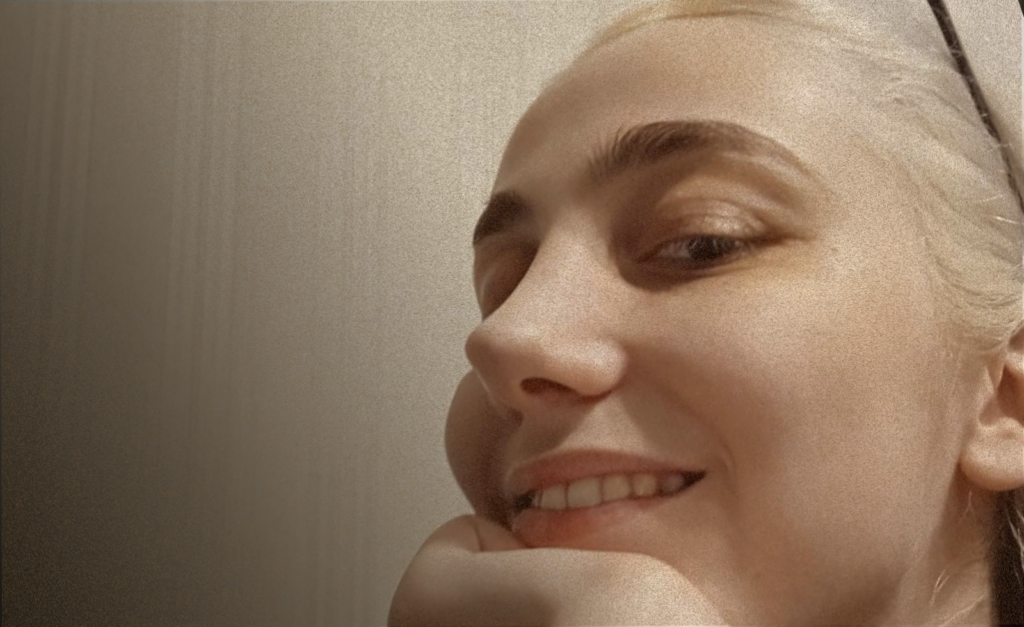Sara Bibulatova was born in Baku, the Azerbaijani capital, but her passport indicates Grozny as her birthplace. The date of birth has also been altered — Sara discovered it accidentally in a conversation with her mother. Sara lived in Baku for 19 years, considered Azerbaijan her homeland, and had no intentions of moving to Chechnya or anywhere else in the North Caucasus.The choice of Baku as the family’s place of residence was not random. Sara’s father could not stay in Russia, because he was on a federal wanted list. The reason remains a mystery to Sara; according to her, the criminal prosecution was somehow linked to her father’s involvement in terrorist organisations. Her family had moved to Azerbaijan before Sara was born, around the same time when many Chechens fled their homeland due to the Second Chechen War.

“My father has no documents, in Baku he lives purely through connections with other Chechens who work in government. Officially he is a refugee in Baku, or something like that. But he doesn’t have a passport. I don’t know how he moved around,” Sara explains.
Sara’s father used to travel frequently via illegal routes, mostly through Georgia to Syria. There, he was involved with ISIS, a terrorist organisation operating in Syria. He ended his trips in 2018, as his health no longer allowed him to endure lengthy journeys. “My mother sometimes told stories about all the challenges they faced getting there, taking tough routes, and how they were received there,” Sara recalls.
Sara’s father didn’t share much about his activities, but he always spoke warmly about Syria and the people he worked with. He even wanted to take Sara there to show her how Muslims should live.
“When I was a teenager, my father wanted to secretly take me with him without my mother’s knowledge, so that I could see what ‘real life’ is like. He believed it was the righteous way. He told me that we live our lives to endure trials. He didn’t care about the war; he would have taken me straight to Syria, so I could be among people like him. He wanted me to learn everything there, like memorising the Quran in Arabic,” Sara recounts.
This religious fervor extended to their everyday life: Sara was raised as a devout Muslim. From a very young age, she performed prayers, read the Quran, and at the age of 10, observed a Muslim fasting called Uraza. At the age of 13, Sara started wearing a hijab, even though the practice is not widespread in mostly muslim Baku. Following religious rituals as a child was painful and she protested against it: “I resisted because I didn’t really understand any of it. When you are forced to do something, you don’t want to do it. But when the beatings started, I could no longer resist. To somehow protect myself mentally, I just started to believe in all of it and clung to what my father told me. But the older I got, the more I discovered about myself. I started to have doubts and questions. ‘Is this what I need? Is this the life I want?'” Sara reflects.

Lack of religiosity was not the only reason for the beatings. Sara could be hit for talking to boys at school. Moreover, her brother, who went to the same school, closely monitored Sara’s interactions, sometimes checking on her during breaks or classes, and would occasionally scold her directly in the classroom.
She was also punished for playing outside. Sometimes Sara’s mother didn’t manage to warn her that her father was coming home. He would catch Sara outside, and then would either beat her on the spot or drag her into the house.Sara’s parents raised her in this way because they had a particular plan for her life. “From my early childhood, I was told that I wouldn’t be working or studying. For a child, it was a hard pill to swallow: all the other kids dream about becoming something, but I was not allowed to do so. My goal in life is simply to be a good, obedient daughter, get married, and preserve my marriage,” Sara explains.
They wanted to take her out of school when she was around 12 years old old. Many girls in the North Caucasus face this situation: they are not even allowed to finish high school. This is usually approved by local authorities and the community. As it turned out, in Azerbaijan, it is not allowed to leave a child without education. Questions arose for Sara’s parents immediately, and her father had no choice but to accept that his daughter would complete the required nine grades of education before being allowed to stay at home.
“Baku is actually a very modern city, and most girls there are independent and self-sufficient. But my father’s mentality always remained the same: he only recognized religion and ISIS. He didn’t like living by the laws created by the government and wanted nothing to do with the state. Even Chechnya is not good enough for him: he says that everyone there is very licentious as well. For my father, everyone is spoiled there and indulges in forbidden things. That’s why he wanted to take me to Syria so that I could be a devout muslim,” Sara recalls.
The girl was to be married off the moment she completed her education. However, the family encountered an unexpected problem: the bride-to-be didn’t know how to cook. The potential suitors came to see her, but her parents couldn’t marry her off because they were ashamed that their daughter wouldn’t make a good housewife. Sara’s culinary skills, or lack of those, often became the reason for conflicts at home.
Sara quickly realised that her failure to prepare meals was the only thing preventing an unwanted marriage. She turned this into her defence: “They tried to teach me to cook. I attended four different cooking courses. I just went there, ate, and went home. I knew perfectly well that the more useless I looked in my parents’ eyes, the longer I would stay at home. So, I just portrayed myself as this good-for-nothing person, like, ‘I can’t, it doesn’t work,'” Sara explains.
After completing her education, Sara spent four years mostly confined to her room at home, rarely going outside. Her father didn’t allow her to go out without supervision, further education was out of the question. The only way to escape and become free from her parents seemed to be through marriage. However, that would mean replacing her parents with an equally controlling husband. In this seemingly hopeless situation, Sara found another way out.

In 2022, Sara reached out to the United Nations and filed a complaint about her situation. She found the contacts online and emailed them. The organisation’s staff invited her family for a meeting. It was Sara herself, her mother and brother who attended the meeting. They were separated into different rooms, and while the staff spoke with her mother and brother, Sara was taken into a shelter by car. She stayed there for several months. However, her parents eventually found her. They came to the shelter with their Chechen acquaintances, and demanded to hand over Sara to them. The staff did not comply with these demands and said that they would not release the girl without her consent.
The social worker warned Sara that her family likely hadn’t changed, and it would be better not to return home. But the psychologist who worked in the shelter had a different perspective, suggesting that family is crucial and that relatives could provide Sara with an education, implying that giving them a chance to change might be the right choice.
“I agreed to it on my own. I believed my parents and I went back home. I am very gullible, and I trusted that psychologist. Later, I found out that my family had bribed her. My mother told me about it. We were sitting at the table one day, and my mom casually said, ‘Actually, we bribed her,'” Sara recalls.
She returned home under certain conditions: the social worker was to come check on her every week. In case of problems, Sara would be taken back to the shelter. However, exactly one week later, Sara, along with her mother and brother, flew to Saratov. She was promised that she would go to college there since they had some family in Saratov, and while it was challenging to find Russian-speaking schools in Baku, it wouldn’t be a problem there. Sara believed her parents because she thought the situation had changed: “That week between the shelter and going to Russia was the best time I ever spent with my family. There was so much attention, care, and understanding. I could finally be honest with my father, we talked about how hard it was for me all this time, and he seemed to understand everything. I sincerely believed that everything would be fine. But it turned out that all this time they had a different plan: to take me out of Azerbaijan.”
Early suspicions arose when Sara’s mother began to act strange. The start of her studies was delayed over and over, and her mother avoided any questions. Initially, she mentioned that she was about to find some courses, then she said that it was summer and no one was studying. Eventually, they started to convince Sara to give up the idea and questioned whether she would be able to study at all, saying, “You need brains for that. And you’re not a good student, so you don’t need it.”
Instead of studying, she suddenly had to go to her sister’s, who lived in Dagestan. Sara became particularly alarmed when her mother told her that she had to start wearing hijab again so that her sister’s husband wouldn’t “think bad of her.” However, her mother promised that they would return to Saratov very soon, and there, Sara would be able to walk around without the hijab.
A few days after Sara’s arrival in Dagestan, two imams came into her sister’s house, invited by her mother. The men claimed that Sara was possessed by jinns and needed serious treatment. Before her phone was taken away, Sara managed to message the UN officials, but they were unable to help as they had no jurisdiction in Russia.
For the next two months, twice a week Sara was taken to an Islamic center in the city of Makhachkala. There, she was persistently treated for jinn possession. An imam would read the Quran to her for an hour and a half, then spit in her face, make her smell herbs. He would also place her on her back and violently beat her with a long stick, bruising her up. If Sara tried to refuse the procedures, the imam threatened her with an electric shocker. Her brother would beat her if she resisted going to the center. Her parents, especially her mother, believed that this would cure Sara of her improper worldview.
“My mom sincerely believed in it. She cried every time, saying it was hard for her to see and know that her daughter is unwell. She constantly complained about why I turned out this way, why I got sick like this, why I became so not normal. She said it wasn’t my ideas and desires, but the jinn inside me, and something had to be done about it.In the first few days, I tried to persuade her. I cried all the time, tried to talk to my parents, but they looked at me as if I were mentally ill, like, ‘how sorry we are for you, look at what all of this has brought you to, you just need to be cured.’ And I realized it was pointless. The more I tried to convince them, the more insane I looked in their eyes.
My father would call me. He asked if I felt better, if I felt that I was changing. In general, he kept telling me the same taglines over and over. Each trip to the center cost around five thousand. My parents didn’t care about the money; they genuinely believed that the most important thing was to cure me, and they were willing to sell everything they had just to see me healed,” Sara shares.
All she had to do was to pretend to get better, to become that “obedient daughter” they wanted her to be. Simultaneously, Sara managed to get in touch with the NC SOS team using her mother’s phone.
She persuaded her mother to go to Saratov for a couple of weeks to see relatives. There, Sara carefully observed her family, calculating when there would be a good time for her escape.
“I picked different days, communicated with the NC SOS team. There were times when we found a convenient route and time, but then it turned out that it was not possible for me at all because someone was at home. And then, one day, my niece went to work, everyone was asleep, and it was 9 am. I even knew the exact time when my mom would be sound asleep. We were in the same room; she slept on the bed right across from me. And I knew that at 9 am, she would be deeply asleep. It was my chance.
I packed my things, the NC SOS team ordered a taxi for me and messaged: ‘Come out.’ I didn’t have time to take anything useful with me: I had a backpack, boots and a jacket in my hands. I only took my Russian passport; they had hidden everything else from me. I opened the door, and my mother woke up. She called for me, and I just ran to the elevator. The elevator was very slow, and I was very nervous. I heard my mother shouting; she was waking up my nephew. I ran out onto the street — thank God, the taxi was waiting right at the entrance. So I escaped.”

After running away, Sara stayed in one of the NC SOS shelters. During that time, she became friends with other residents, including Seda Suleymanova. Leaving the country was a difficult decision for Sara — she had to sacrifice the comfort of a familiar environment for safety and freedom.
“I had to wait a long time to move to another country. Fortunately, the flight went smoothly. The country that welcomed me is wonderful. Everything worked for me, and I’m so happy about it. I decided to leave because I didn’t want to spend my whole life hiding in fear that I would be found, that someone would come after me.”
A few days after Sarah had left the country, the police came to the NC SOS shelter. They were looking for Sara, allegedly missing. The report about a missing person was filed by her family, even though they knew that the girl left home voluntarily.
Before this, Sara had twice removed herself from the missing persons list and filed statements that she left home on her own and did not want to come back. She was not in the missing people database when she was leaving Russia. Only after confirming that Sara had left the country, the authorities stopped looking for her. The location of the NC SOS shelter had to be changed. Most shocking for Sara since her moving abroad was not adapting to the new place, but the news from Russia. In August, Sara’s close friend Seda Suleymanova was abducted by the police and Chechens from her apartment in St. Petersburg. Seda was taken back to Chechnya as a suspect in a theft, but questioned as a witness and handed over straight to her family. Since then, Seda has not been in touch.

“I remember that day I came home from work. My friend said, ‘Just sit down; I’m going to tell you something.’ I read the news, and I sat therestill the morning waiting for updates. For several days, I just cried. I don’t think I’ll ever be able to forget this. I was in a really bad mental state.””I know she will never adjust to the environment she’s currently in. She has a very strong character and will not, under any circumstances, conform to all of this. It was very hard for me then, and it’s still like this. Especially when I think about what she might be going through right now.”